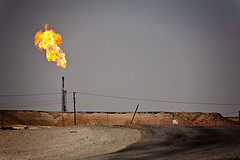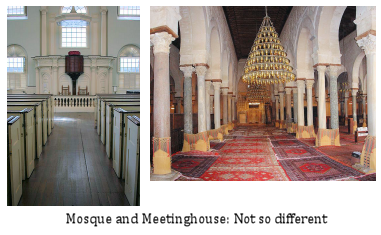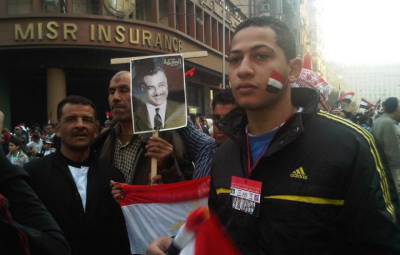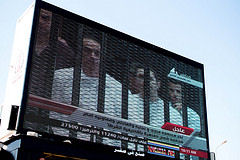
Oil wealth after the Arab Spring: A trillion-dollar catalyst for change
At the end of the 19th Century, Lord Curzon, the then British Viceroy of India, described Iran and its Arab neighbours as “pieces on a chessboard upon which is being played out a game for the domination of the world”. The geostrategic importance of the Middle East, with its immense oil wealth, has shaped the policies of colonial empires, secured the longevity of autocratic regimes and given rise to religious elites. The ‘game of chess’, as described by Lord Curzon, promises great riches and influence for the players involved, but has often come at a huge cost for the majority of the Arab people. Indeed, oil wealth, so narrowly shared between the region’s ruling minorities, has historically presented a barrier …

Many Trails to Freedom: Islamic Democracy is not an Oxymoron
“I disapprove of what you say, but I will defend to the death your right to say it.” – Voltaire. Over Christmas I visited Boston and had the occasion to walk the famous freedom trail: 3 miles of sights commemorating American independence. As I walked this hallowed ground I pondered on those fighting for freedom today, in the streets of Cairo, Homs and Tunis. Having met some of these people, I wondered at the suspicion we direct at the Islamic parties now gaining power, as if we forgot our own history. American democracy was born of Puritan principles of self-government, but that did not prevent it from evolving into the (more or less) secular body it is today. Ignoring this …
What Obama didn’t say about Iraq
The Iraq war was not a success. It was a failure. A dismal failure, and Western governments should learn from their mistakes. Of course, nobody can deny the brutal crimes that Saddam Hussein was responsible for. The savage attacks against the Kurdish population in Northern Iraq, the invasion of Kuwait and the terrorising of innocent civilians in the town of Dujail after an assassination attempt serve as prime examples of the sadistic nature of the Iraqi dictator. The world is definitely safer without him, but this in no way outweighs what the world, and in particular the Iraqi people, have had to give up. Transparency International’s most recent Corruption Perception Index (measured in 2010) ranked Iraq as having 175th most …

Turkey in the world – between continuity & change
Just returned from a talk by the current Turkish Ambassador to the UK. The event was under Chatham House Rules, hence I will not be able to report from it. But I will use this and previous events in the last couple of weeks as an anchor for some reflections on Turkish Foreign Policy. // A rising power… Last week Davutoglu, Babacan, Boris Johnson and Jack Straw gave some interesting speeches at a dinner in London. The overall tone was clear: Turkey is a rising regional if not global power. It is the 16th biggest economy in the world with phenomenal stable growth figures currently approximately at around 8% per annum. Erdogan is a leader empowered with all three Weberian …

The Myth of ‘Sixty Years of Oppression’
Reem Abou-El-Fadl has recently published an article in Al-Akhbar English newspaper entitled ‘From Nasser to Tantawi: The Myth of “Sixty Years of Oppression”‘. The article considers the connections that have been made in Egypt between the July 1952 Revolution, launched by the Free Officers movement, and the January 2011 Revolution, launched by this year’s popular uprising in Egypt. The article acknowledges that military officials first came into government after the July Revolution, but it goes on to explore the deceptive myth of ‘sixty years of oppression’ since, which has been heard often in recent months. ‘Yet today’s generals are protecting an entirely different set of interests from those important to the Free Officers. They have presided over months of delay …
Yemen’s Winter of Discontent
As the Arab Spring continues to reverberate through the countries of the Islamic Middle East, attention has now turned to the impoverished Arabian Peninsula state of Yemen. There the popular rising against President Ali Abdallah Saleh’s regime that began last February, inspired by events in Tunisia and Egypt, is now rapidly descending into a bloody civil war. In a country where every second person owns a gun, the escalation of violence has been gradual but deadly. Hundreds have been killed during September in heavy fighting on the streets of the capital Sana’a, as forces loyal to the government have sought to violently suppress street protests. In response, army units that have defected are protecting the protestors. As these well-armed military formations …
Visibility, seeing and displacement: on the work of the photographer Miki Kratsman
On the 31 July 2011, photographer Miki Kratsman, head of the photography department of the Bezalel Academy of Art and Design, learnt that he was the recipient of the EMET Prize for Art, Science and Culture awarded by the Prime Minister of Israel. Kratsman expressed his surprise (http://www.haaretz.co.il/hasite/spages/1239559.html): “when a minister like Liebermann is in office, and people understand his logic and do not go out to the streets and protest against the horrible things he does, I am awarded with a prize”. There is, indeed, a sharp opposition between the brutality and ruthlessness of the current Israeli government, Kratsmans’ bold interventions into the seemingly stable status quo, and the decision to award him a with prize. In a long …

Trying Mubarak
I have recently published an article entitled ‘Trying Mubarak’, discussing what has been called ‘the trial of the century’ in Egypt. I argue that the trial of former Egyptian President Hosni Mubarak, which began on 3 August 2011, represents a barometer of the fortunes of the January Revolution as a whole. A common challenge confronts both the achievement of accountability in the trial, and the fulfilment of the Revolution’s demands, namely the role of the ruling Supreme Council of the Armed Forces (SCAF). This article discusses the achievement which the holding of this trial represents in the context of the revolution, as well as the practical challenges faced by the legal team of the victims’ families. It then considers the …









